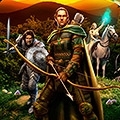Your Next: Building Bridges
How SOE Plans to Bring Players, Artists and Programmers Together

In one of the first editions of Your Next, I wrote about the importance of new media for the success of new online games. I argued that companies could do a lot more to support streamers and content creators as the net benefits far outweighs the cost. I think we're at a point where it's difficult to argue that's not the case, but some companies stick to tried and tested methods of getting their message out to the community. SOE has been fantastic so far in promoting and supporting community created content, and is going above and beyond in terms of giving streamers the tools they need to become centres for the community. From promotion on the Landmark homepage, to donating keys for in-game items, even going as far as inviting local streamer Aradiah onto the official weekly Landmark show.
When the team behind Landmark and EverQuest Next say they want to support user generated content, they really mean it, and I got to experience it first-hand.
As some of you know, I can be found on YouTube and Twitch doing various things about Landmark and EQNext. Over the last six months or so I have been consistently surprised and delighted by the support my content-creating friends and I have received. None of that prepared me for the invitation I received a few weeks ago to come to London to meet some of the core team making the games I am so passionate about.
I'm sure you can imagine this was an incredible experience. Talking combat design with Landmark and EQNext Creative Director Jeff Butler, chatting about the state of the MMO industry with Senior Producer Terry Michaels and witnessing the fabled energy and enthusiasm of Director of Development Dave Georgeson were opportunities that don't come along every day. As for the content of those conversations, while I can't go into detail, I will say that when they talk about the design goals of Landmark and EQNext, they are not paying lip-service to an idea. If you have been looking for a next-gen, revolutionary MMO with the sense of adventure that made EverQuest a phenomenon, this could be it.
Along with representatives from SOE, the co-founders of Storybricks were also at the event. For those of you who are unaware, Storybricks is an Emergent Artificial Intelligence technology company, they have partnered with SOE to help bring about one of the fundamental design concepts of Landmark and EQNext; an emergent AI system that changes the way players interact with the game.
Speaking with Storybricks co-founder and lead designer Stéphane Bura about game design was a revelation, and one of his ideas in particular stood out to me while considering Landmark and EQNext: creating intuitive tools that allow developers to more easily collaborate when working on different aspects of a game.
One of the main goals of Storybricks is to allow a new type of game design. Traditionally, design can work from the artistic spectrum or the programming spectrum, and we are left to hope that they can meet in the middle and complement each other. One of the goals of Storybricks is to create a mid-point, a place where the art and code can begin life together and branch out as they need to. The idea is that this starting point makes it easier to create synergy between the different systems of a game, and when all the different pieces work to complement each other you have a much better chance of making a compelling experience for players.

This approach ties in so neatly with the goals of Landmark: to create a system of game design so intuitive it can be used by the average MMO player, and yet sophisticated enough to be used to build a full-scale MMO using SOE's flagship IP. A grand ambition, but one that SOE and Storybricks believe can be realized.
When the concept for Landmark as a design tool was first floating around, Jeff Butler was asked if it wouldn't be easier for an artist to just use a third-party modelling tool and import the result into the game. He answered that if it was, then the design team would have failed—it should be easier to start in Landmark.
If the team is successful in their goals, this could be a turning point for user-generated content, and perhaps even the way we approach the fundamentals of game design.
So if you've always dreamt of making games, Landmark could be an excellent place to start.





